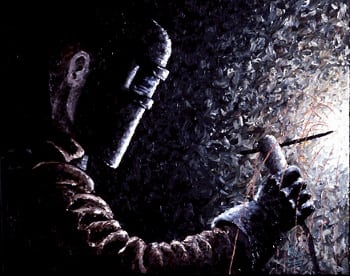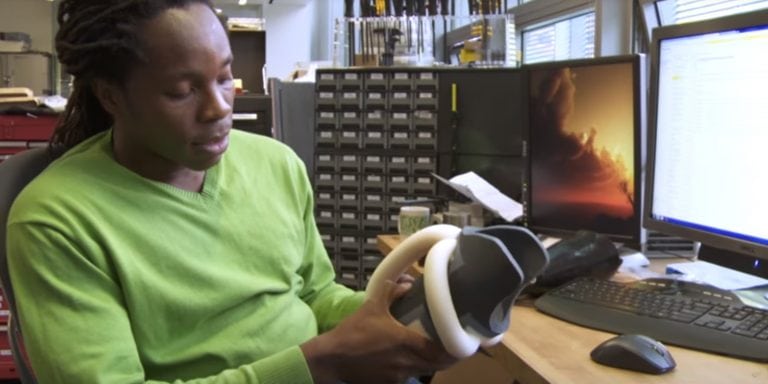What would a hackerspace for engineers and artisans look like in a city like Accra, Ghana? Or Iquitos, Peru? The idea has enticed thought leaders in international development, and there may be plans underway to start an experiment.
For years, hackerspaces have churned out code, hardware and the uniquely nerdy toys that could, at their best, underpin future generations of technology. They’re often amazing and frivolous, and sometimes they can scare people at a bus stop, like this MP3 player inside a grenade. Their members celebrate open source design and free collaboration, and the spaces are turning up in cities from New York to Tokyo.
For an introduction to the concept, please see this clip from an interview with Eric Michaud, president of Pumping Station: One, a hackerspace in Chicago, Ill. For the initiated, read on.
The beauty of these spaces is that people use them to make things. Their focus is usually on innovations in electronics and software, but it’s easy to imagine a modified space for building power generators, water pumps, artistic crafts and even things that nobody has thought of, yet. Especially those things.

This is a screen capture of the Afrilabs site. Technology hubs like Afrilabs’ members are worthy models for a possible modified hackerspace.
“You could take this idea of what we do with Web and mobile stuff and do it with manufacturing—a true hacker garage of hardware that has the tools that people need to do things,” says Erik Hersman, a member of iHub in Nairobi, Kenya. iHUb is one of the new technological hubs turning heads in Africa.
This is the idea that we’ve heard from Hersman and others. The modified hackerspace could retain the ethos of cooperation and openness that makes these places tick, but it would have fewer laptops and more bandsaws and milling machines.
We might see movement on this idea sometime soon. The people involved didn’t want to go on the record while they’re still in the planning stage, however. In the meantime, we asked some of the makers at Maker Faire Africa for their thoughts on a hackerspace.
Alex Odundo
Alex Odundo, founder of Sifa Machinery in Kenya, is one of the innovators that E4C applauds: He designs and builds wind-powered generators and machines to process sisal to make rope. And he was moved to write a long email to E4C about the prospect of a hackerspace.It’s hard not to catch Odundo’s enthusiasm about this idea after seeing the depth of thought he has given it.
Emeka Okafor, one of the founders of Maker Faire Africa, is a champion of the idea of modified hackerspaces in Africa. He tweets news on the theme with the hashtag #hackerspaces.
Nurturing a ‘Maker’ ethos…. ‘ #Google replants its garage roots in tech workshops’ http://bit.ly/h2fMTN #hackerspaces #diy
“This is a concept I have been anticipating for talented young Africans for many years,” he writes. “It’s true that there are other pressing needs that our community has to deal with. However, we have to start from a point. This point is to find solutions to problems, and this must start by promoting appropriate technology through the provision of spaces like a hackerspace.”
He made a long wishlist of tools and services that a hackerspace could provide: lathes, steel drill, grinders, table saw, arc welder, hacksaws, trammels, vises, shapers, gear hobber, and so on.
The space, he says, could also provide courses in engineering, computer-assisted design and marketing, as well as educational resources and a place to display the finished products.
“This could be a place where entrepreneurs who are full of ideas come together create products,” Odundo says. “It could train employees in technological & business skills, help reach appropriate markets and identify relevant producer and consumer services to expand business or improve a technology.
“Talented minds could be identified through schools, colleges, universities and from the Jua Kali sectors [the word for micro-industry in Kenya]. They could then be given opportunities to research their ideas, share techniques and gain access to tools and equipment, materials and other support.”
Cyrus Kabiru
Some of most distinctive photos from Maker Faire Africa 2010 were of Cyrus Kabiru in his bushpunk eyewear. Kabiru is a Kenyan painter and sculptor who has participated in something akin to hackerspaces for artists. He emailed us some of his ideas for possible new spaces in Kenya.

This screen capture of the Matchamaker site shows Cyrus Kabiru’s interesting eyewear.
“If you could start one, you could work with everyone, from mechanics to scientists, doctors to artists, just combining everything the way Maker Faire does. That’s what we don’t have in Kenya or Africa in general. And, sure, I’d like to be on such a space.”
As an artist, the tools he would suggest differ from those on Odundo’s list: Chain saws for sculptors, chisels, paint, brushes, canvas, printing press, dark room, kiln, foundry, and a van for transporting people in residency. And the place would have to be active, with daily events like workshops and group projects, he says.
“As my grand father use to tell me, “If you have a dream never sleep,” Kabiru says. We’re hoping that some people with ideas about founding hackerspaces are having trouble sleeping these days.


How to made Home equpments semply